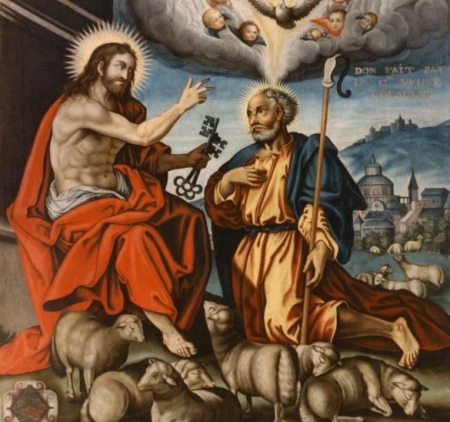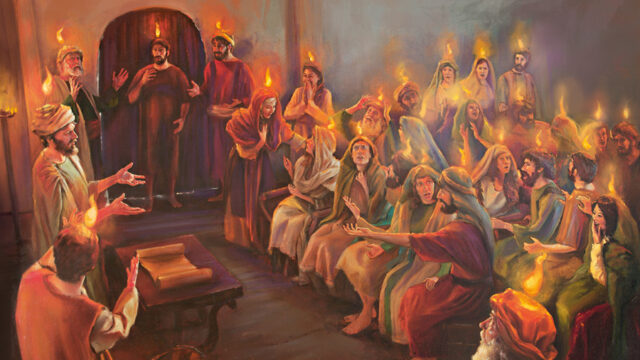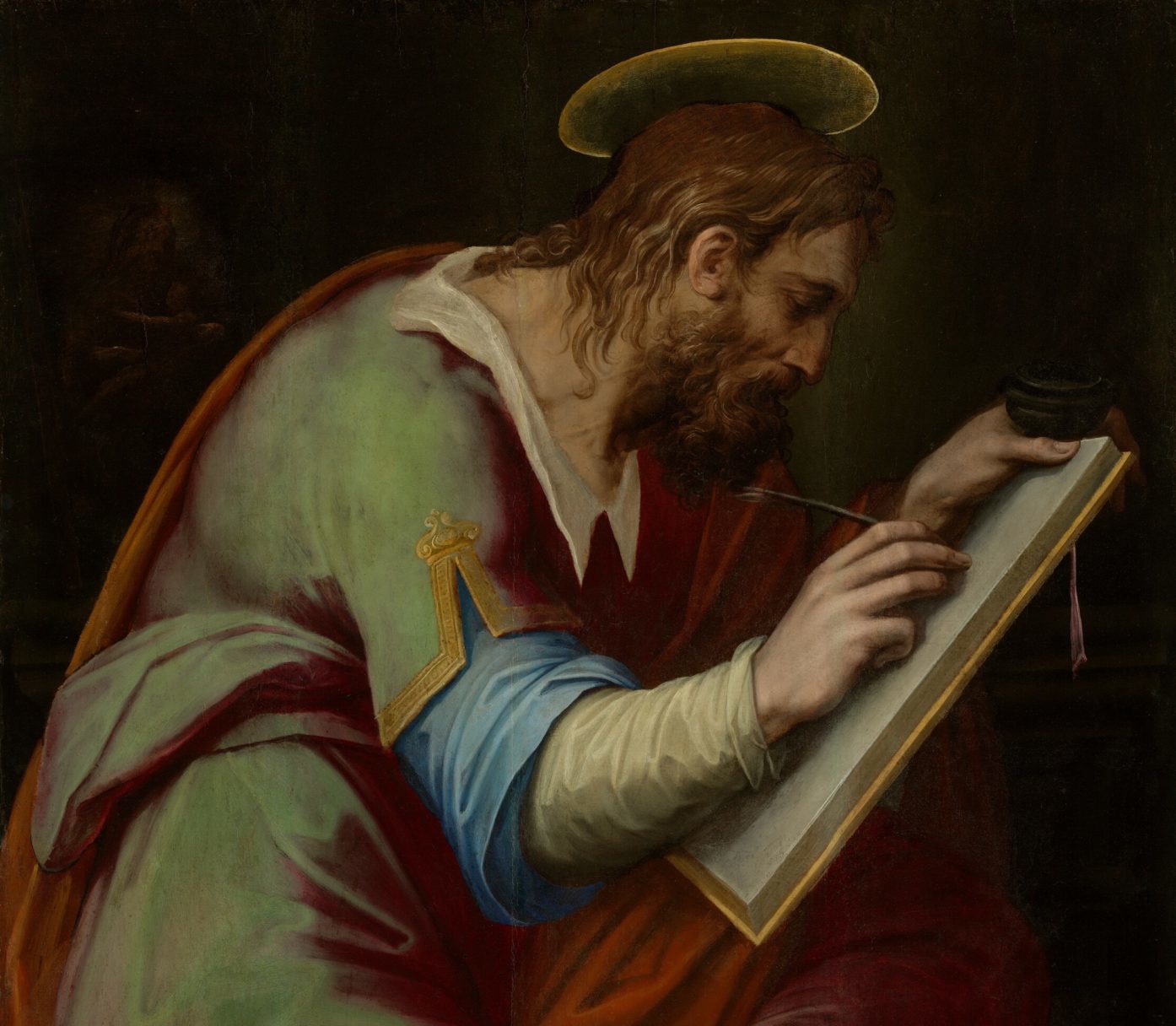
The apostle Peter
Like the Old Testament, the New Testament canon developed in similar fashion. The source of the information came from God who inspired men to write it,
and canonization was the process men used to determine what writings to collect as authoritative for the faith and practice of Christian living and worship.
Unlike the Old Testament, the New Testament has lots of biblical, extrabiblical and historical evidence to cross reference and validate the New Testament
accounts.
1. Is the book divinely inspired, a process that includes both the writer and his writing; in essence is the author a man of God?
Selected by Jesus to be His disciples, the Jewish apostles used the Old Testament process as a model of recording their eyewitness accounts to testify to
the Son of God and the gospel. Jesus' last words to the apostles were, "you shall be My witnesses both in Jerusalem, and in all Judea and Samaria, and even
to the remotest part of the earth" (Acts 1:8, NASB).
Inasmuch as many have undertaken to compile an account of the things accomplished among us, just as they were handed down to us
by those who from the beginning were eyewitnesses and servants of the word, it seemed fitting for me as well, having investigated everything carefully
from the beginning, to write it out for you in consecutive order, most excellent Theophilus; so that you may know the exact truth about the things you have
been taught. (Luke 1:1-4, NASB)
This is the disciple who is testifying to these things and wrote these things, and we know that his testimony is true. And there
are also many other things which Jesus did, which if they were written in detail, I suppose that even the world itself would not contain the books that would
be written. (John 21:24-25, NASB)
For we did not follow cleverly devised tales when we made known to you the power and coming of our Lord Jesus Christ, but we were
eyewitnesses of His majesty. (1 Pet 1:16, NASB)

Pentecost
2. Is the author confirmed by a supernatural act of God?
Like some of the Old Testament prophets, New Testament prophets received supernatural abilities that validated their prophetic status as a messenger
of God.
Now Peter and John were going up to the temple at the ninth hour, the hour of prayer. And a man who had been lame from his mother's
womb was being carried along, whom they used to set down every day at the gate of the temple which is called Beautiful, in order to beg alms of those who
were entering the temple. When he saw Peter and John about to go into the temple, he began asking to receive alms. But Peter, along with John, fixed his
gaze on him and said, "Look at us!" And he began to give them his attention, expecting to receive something from them. But Peter said, "I do not possess
silver and gold, but what I do have I give to you: In the name of Jesus Christ the Nazarene—walk!" And seizing him by the right hand, he raised him up;
and immediately his feet and his ankles were strengthened. With a leap he stood upright and began to walk; and he entered the temple with them, walking
and leaping and praising God. And all the people saw him walking and praising God; and they were taking note of him as being the one who used to sit at
the Beautiful Gate of the temple to beg alms, and they were filled with wonder and amazement at what had happened to him. (Acts 3:1-10, NASB)

The physician historian Luke
3. Does the author tell the truth about God?
Unique to the New Testament is that its authors were contemporaneous of each other, knew each other personally, and had a shared experience with
Jesus Christ. The New Testament canon developed within a short period of time, because the hearers of the first century recognized that the writers were
revealing the word of God; thus, the canon was established before it was formally recognized or fixed by any church council.
For this reason we also constantly thank God that when you received the word of God which you heard from us, you accepted it not
as the word of men, but for what it really is, the word of God, which also performs its work in you who believe. (1 Thes 2:13, NASB)
Just as in the Old Testament, literacy was low and New Testament writings were circulated to be read by "readers."
Therefore, beloved, since you look for these things, be diligent to be found by Him in peace, spotless and blameless, and regard
the patience of our Lord as salvation; just as also our beloved brother Paul, according to the wisdom given him, wrote to you, as also in all his letters,
speaking in them of these things, in which are some things hard to understand, which the untaught and unstable distort, as they do also the rest of the
Scriptures, to their own destruction. You therefore, beloved, knowing this beforehand, be on your guard so that you are not carried away by the error of
unprincipled men and fall from your own steadfastness, but grow in the grace and knowledge of our Lord and Savior Jesus Christ. To Him be the glory, both
now and to the day of eternity. Amen. (2 Pet 3:14-18, NASB)
When this letter is read among you, have it also read in the church of the Laodiceans; and you, for your part read my letter that
is coming from Laodicea. (Col 4:16, NASB)
4. Does the book come with the power God?
The New Testament canon is the inauguration and prophetic fulfillment of God's New Covenant. Here salvation is only possible through the work of
atonement by the Son of God. Jesus Christ's sacrifice is the only means and power to avert the wrath of God His Father.
You, however, continue in the things you have learned and become convinced of, knowing from whom you have learned them, and that
from childhood you have known the sacred writings which are able to give you the wisdom that leads to salvation through faith which is in Christ Jesus.
All Scripture is inspired by God and profitable for teaching, for reproof, for correction, for training in righteousness; so that the man of God may be
adequate, equipped for every good work. (2 Tim 3:14-17, NASB)
The New Covenant bestowed upon the Believer the Holy Spirit that enables the Believer to serve God in a variety of ways.
He said to them, "It is not for you to know times or epochs which the Father has fixed by His own authority; but you will receive
power when the Holy Spirit has come upon you; and you shall be My witnesses both in Jerusalem, and in all Judea and Samaria, and even to the remotest part
of the earth." (Acts 1:7-8, NASB)
And suddenly there came from heaven a noise like a violent rushing wind, and it filled the whole house where they were sitting.
And there appeared to them tongues as of fire distributing themselves, and they rested on each one of them. And they were all filled with the Holy Spirit
and began to speak with other tongues, as the Spirit was giving them utterance. Now there were Jews living in Jerusalem, devout men from every nation under
heaven. And when this sound occurred, the crowd came together, and were bewildered because each one of them was hearing them speak in his own language. They
were amazed and astonished, saying, "Why, are not all these who are speaking Galileans? And how is it that we each hear them in our own language to which we
were born?" (Acts 2:2-8, NASB)
Now concerning spiritual gifts, brethren, I do not want you to be unaware. You know that when you were pagans, you were led astray
to the mute idols, however you were led. Therefore I make known to you that no one speaking by the Spirit of God says, "Jesus is accursed"; and no one can
say, "Jesus is Lord," except by the Holy Spirit. Now there are varieties of gifts, but the same Spirit. And there are varieties of ministries, and the same
Lord. There are varieties of effects, but the same God who works all things in all persons. But to each one is given the manifestation of the Spirit for the
common good. (1 Cor 12:1-7, NASB)
As the New Testament writers attested to what they saw, heard, investigated, and learned from divine sources, their works were collected and preserved by
the early church. If written by a prophet or apostle of God, the work was God's word, and it must be preserved. Several factors pressed the early church to
collect and quickly codify the New Testament canon.
1. The early Christian church and their leaders needed to know the theological and ethical norms demanded by God, and the solution to practical
problems of the church. The writings were read, circulated, collected, and quoted as part of Scripture; they supplemented the Old Testament.
Prescribe and teach these things. Let no one look down on your youthfulness, but rather in speech, conduct, love, faith and purity,
show yourself an example of those who believe. Until I come, give attention to the public reading of Scripture, to exhortation and teaching. (1 Tim 4:11-13,
NASB)
2. The problem of heresy and false teaching was prevalent and contemporaneous with the apostles, and their supernatural abilities and stature attracted
the unsavory for personal gain and false teaching.
When they had gone through the whole island as far as Paphos, they found a magician, a Jewish false prophet whose name was
Bar-Jesus, who was with the proconsul, Sergius Paulus, a man of intelligence. This man summoned Barnabas and Saul and sought to hear the word of God. But
Elymas the magician (for so his name is translated) was opposing them, seeking to turn the proconsul away from the faith. (Acts 13:6-8, NASB)
Beloved, do not believe every spirit, but test the spirits to see whether they are from God, because many false prophets have gone
out into the world. By this you know the Spirit of God: every spirit that confesses that Jesus Christ has come in the flesh is from God; and every spirit
that does not confess Jesus is not from God; this is the spirit of the antichrist, of which you have heard that it is coming, and now it is already in the
world. (1 John 4:1-3, NASB)
3. Persecution, imprisonment, and death motivated the early church to copy, distribute, and hide canonical material so that it wouldn't be lost.
This is in contrast to the early beginnings of the Hebrew Old Testament which didn't have such pressures until much later. Early Christianity would
experience persecution from its beginning until Constantine the Great, who would become a Christian in 313 A.D.
Agrippa I, ruler of Judea (41-44 A.D) effectively becomes the "King of the Jews," and supports Jewish suppression of the Christian sect
of Judaism. The apostle James, the son of Zebedee who was Jesus' first disciple, is killed by the sword in 44 A.D. and the apostle Peter is arrested
(Acts 12:2-5).
The Roman emperor Nero (54-68 A.D.) accused Christians of starting the Great Fire of Rome to remove suspicion from himself, and many were
executed "by being thrown to the beasts, crucified, and being burned alive."
...To get rid of the report, Nero fastened the guilt and inflicted the most exquisite tortures on a class hated for their
abominations, called Chrestians by the populace. Christus, from whom the name had its origin, suffered the extreme penalty during the reign of Tiberius at
the hands of one of our procurators, Pontius Pilatus, and a most mischievous superstition, thus checked for the moment, again broke out not only in Judaea,
the first source of the evil, but even in Rome, where all things hideous and shameful from every part of the world find their centre and become popular.
( Tacitus, Annals 15.44)
Roman emperor Diocletian (284-305 A.D.) initiated the last and largest official persecution of Christianity (303-312 A.D.) across the
entire Roman empire.
It was the nineteenth year of the reign of Diocletian, and the month of Dystrus, or March, as the Romans would call it, in which,
as the festival of the Saviour's Passion was coming on, an imperial letter was everywhere promulgated, ordering the razing of the churches to the ground
and the destruction by fire of the Scripture, and proclaiming that those who held high positions would lose all civil rights… (Eusebius, Ecclesiastical
History, 8.2)
Throughout this chaotic period of early Christianity, works by an apostle or prophet were copied, collected, and cited from the earliest times. Because
they were considered authoritative, the church was considered as "built upon the foundation of the apostles and prophets (Eph 2:20) whom Jesus Christ
promised through the Holy Spirit to guide into all truth (John 16:13).
Validation of the New Testament canon can be seen in examples of other authors quoting others:
For the Scripture says, "You shall not muzzle the ox while he is threshing," and "The laborer is worthy of his wages."
(1 Tim 5:18 – Paul is quoting Deut 25:4 and Luke 10:7)
But you, beloved, ought to remember the words that were spoken beforehand by the apostles of our Lord Jesus Christ, that they were
saying to you, "In the last time there will be mockers, following after their own ungodly lusts." (Jude 1:7-8 – Jude is quoting 2 Pet 3:3)
The apostolic Fathers (first generation of leaders after the apostles and disciples of them) would add their mark of validation with extensive reference
to and quotations of the gospels, Acts, and the epistles. As early as the second century, New Testament translations confirmed the list of canonical books,
and for the first 500 years of the twenty-seven books of the New Testament existence, virtually all of them were quoted as authoritative and recognized as
canonical by the younger contemporaries of the church Fathers.